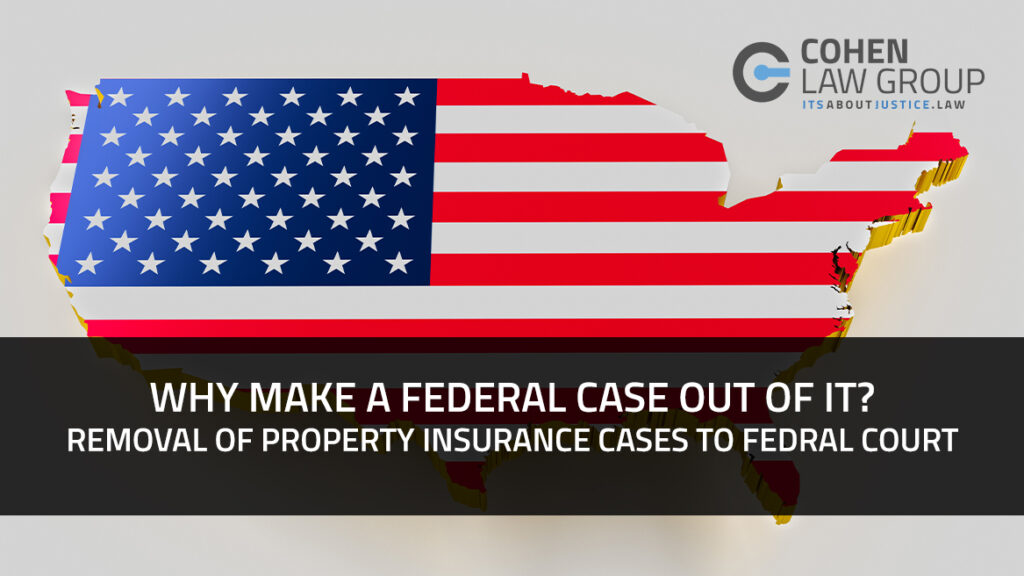Why Make a Federal Case Out of It? Removal of Property Insurance Cases Into Federal Court
By Kevin Vorhis
Imagine this scenario: you live in and own a house in Florida, and it is badly damaged by a storm. You file an insurance claim with your insurance company, which is headquartered outside of Florida, and your insurance company denies your claim. You disagree with the insurance company’s assessment of the claim, and you hire a lawyer to represent you in a lawsuit against your insurer. Your lawyer starts a lawsuit against your insurance company in state court, in the county where your house is located. Everything appears to be going smoothly, and then suddenly your attorney informs you that your insurance company has removed your case from state court into a federal court. How did your state court case suddenly become a federal case? How can an insurance company remove your case to a completely different court—with completely different procedures—all by itself? This article examines these questions.
To understand how a case filed in state court can be removed to a federal court, you must first understand a little bit about how jurisdiction works. Simply put, “jurisdiction” describes a court’s legal authority to administer justice. In practical terms, “jurisdiction” describes a court’s ability to hear and resolve cases. A court must always have jurisdiction over a case in order to even begin the case. Without jurisdiction, a court has no authority over a case whatsoever. In the United States, jurisdiction is generally comprised of two components: (1) jurisdiction over the subject matter of a case (the law and the facts of the case), and (2) jurisdiction over the parties in the case (also known as “personal jurisdiction”). In order to have jurisdiction over a case, a court must have both personal jurisdiction and subject matter jurisdiction over the case.
Regarding personal jurisdiction, a court must have jurisdiction over the parties to a lawsuit. For example, a court in Florida would not have personal jurisdiction over individuals in Oregon for a dispute that only took place in Oregon. Personal jurisdiction can become far more complicated, especially when dealing with corporations (which are legal entities that can be all over the world), but the general idea is that the parties to a lawsuit must have some connection to the state in which the lawsuit is brought. An Ohio man suing another Ohio man for an event that occurred in Ohio cannot bring a suit in Florida to resolve the dispute; he would most likely have to bring it in Ohio. Likewise, in the opening scenario, a Florida state court would have personal jurisdiction over the case, because both you and your house are located in Florida, and your insurance company has transacted business in Florida by issuing you an insurance policy under the laws of the state of Florida.
Regarding subject matter jurisdiction, certain courts have only limited subject matter jurisdiction. That is to say that certain courts can only resolve disputes in very narrow areas of the law. For example, federal bankruptcy courts alone have the legal authority to hear and decide bankruptcy cases. No other court in the country has that power. By contrast, most state level trial courts are courts of “general jurisdiction”, meaning that their subject matter jurisdiction is not limited to certain types of disputes. They have the general power to resolve most disputes that arise within their geographical area of the state (such as a county), apart from certain pre-empted subject matters (such as bankruptcy). In the first example, you can properly bring your lawsuit against your insurance company in your local circuit court, because your dispute (most likely a breach of contract action) falls within the general jurisdiction of your state court. Most likely, your attorney would bring suit in the county where you and your house reside.
Now, how does a state court claim suddenly wind up in federal court? Federal courts in the U.S. are courts of limited jurisdiction. Federal courts only have the power to resolve disputes in a number of limited subject matters. Among these subject matters, are (1) disputes involving federal question(s) and (2) disputes involving “diversity of citizenship”. Federal question jurisdiction is exactly what it sounds like. In order for a federal court to have jurisdiction arising under federal question jurisdiction, the case must involve some kind of federal law (i.e. a “federal question”). Unsurprisingly federal courts have the power to interpret federal laws, and create federal case law. Interestingly, state courts also have the power to interpret federal laws, and they are not bound by federal courts’ decisions (apart from the U.S. Supreme Court).
Federal diversity jurisdiction arises when two conditions are met: (1) there must be complete diversity of citizenship between the parties and (2) the “amount in controversy” is greater than $75,000.00. Diversity of citizenship is also exactly what it sounds like. The parties must be citizens of different states. In the first example, diversity of citizenship exists in your case, because you reside in Florida, and your insurance company is headquartered outside of Florida. As to the second element, your claim against your insurance company must be greater than $75,000.00, in order to have diversity jurisdiction.
Once federal diversity jurisdiction exists, any claim—even if it is also proper in state court—may be brought in federal court. When you started your lawsuit, you could have brought your claim in either state court or federal court. Even though you brought your claim in state court, the other party has the right to remove your case to federal court within 30 days after receiving the lawsuit. This is according to federal law, which expressly grants “original jurisdiction” to the federal court in all diversity cases (28 U.S.C. § 1332). Procedurally, this is done by the party seeking to move the case to federal court by filing a “Notice of Removal” in the federal court. If your attorney believes that their removal to federal court is improper, then you can file a “Motion for Remand” within 30 days after the filing of the Notice of Removal. Once a case is removed to federal court (and not remanded back to state court), then the case will be decided by a federal judge. All of the procedural rules of the federal court will apply to your case, even though the federal judge will still apply state law.
Why do some insurers prefer to remove cases to federal court? There are potentially strategic reasons to do so. For instance, if an insurer sees that the case has been assigned to a judge in a state court that they think will rule unfavorably to them, they may want to remove the case to another judge, which can be easily done by removal to federal court. Likewise, many attorneys are not admitted to federal court, or they are not familiar with federal court procedures, so removal may be a way for the insurance company to catch your attorney off-guard. Also, federal courts tend to be generally uniform across the country, and abide by strict procedural guidelines. Some insurers may prefer the increased formality of the federal court system, which again can catch an unfamiliar attorney off-guard.
If you are concerned that your insurance claim could potentially end up in federal court, or if you have a question about your claim in general, please give us a call. Many of our attorneys have experience practicing in both state and federal courts, and we have attorneys who have experience dealing with federal removal issues.
You can call our office 24 hours a day at 407-478-4878.

Kevin Vorhis, Esq.
DISCLAIMER: This website is for informational purposes only and does not provide legal advice. Please do not act or refrain from acting based on anything you read on this site. Using this site or communicating with Cohen Law Group through this site does not form an attorney/client relationship. This site is legal advertising. Please review the full disclaimer for more information by clicking here.








